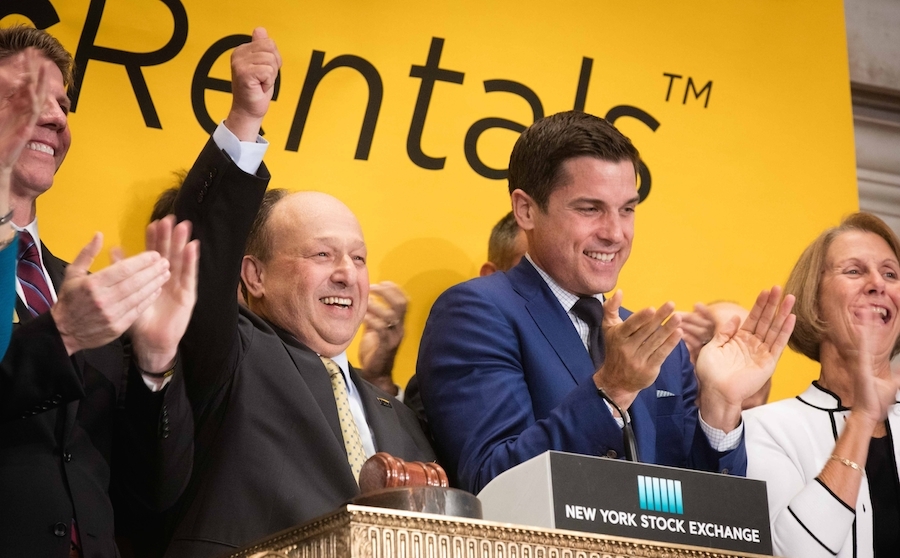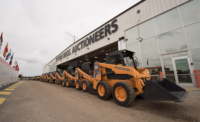As its separation from Hertz Car Rental finishes up, the newly rebranded Herc Rentals—the firm's former equipment rental arm—celebrated its first day as an independent company with a ring of the opening bell of the New York Stock Exchange on July 1. Having run the company since its separation began roughly a year ago, CEO Larry Silber is looking to reinvigorate a 50-year-old company that he believes has grown somewhat complacent. Silber sat down with ENR editors on July 14 to discuss the state of the rental market and the future of Herc Rentals.
ENR: What was the thinking behind the new name?
Silber: We took what was our acronym which was Hertz Equipment Rental Corporation and made that our name, we’ve eliminated the word equipment in order to give us the opportunity to move into and different types of gear, and not just, the traditional construction equipment that our company has traditionally been known for. And we thought it also gave us a greater opportunity to diversify outside of what we view as our core businesses into some ancillary areas and adjacent product areas that will allow us to stay in a business that is less affected by the typical construction cycles and cyclicality.
ENR: What kinds of diversification in offerings can people expect from Herc?
We are still going to have construction equipment, we’re not going to eliminate our core products, but we’re going to supplement our core products in two primary areas. What we call Pro Contractor products, Pro Contractor tools. So different types of equipment: smaller equipment, that the professional contractor might have around in his business—some HVAC equipment, dehumidification equipment, drying equipment, Hilti hammer equipment, Tennant floor sweepers, things that traditional may not have been rented, but are now being rented.
You have this secular movement from ownership to rental which has been pretty dramatic over the last 20 years, is continuing at about a 5% plus CAGR [compound annual growth rate] from ownership to rental, and as that is shifting there are reliable sources like us to rent this type of product from.
The other area is used to be called specialty businesses, we changed it to something called Pro Solutions. It is more than just providing the product, we are helping design, configure and even engineer a solution to their project, and then bringing everything in addition to just the equipment, we bring in all the necessary support material to make that project complete.
[One example] is recently there was a big construction project that needed to have a foundation dug. The foundation was full of water, so we came in, determined the size of the pumps that needed to drain water and we provided the engineering to determine the size of the pumps, and all of the hosing that went along with that to discharge all of that water that accumulated to dry out that foundation.
So we’re focusing now on what we call solutions-oriented selling, where we’re doing some engineering, since some things are a little more complex than just delivering a tractor loader backhoe where the operator knows what to do with it. We’re not going to abandon our core business, which is providing equipment of various types from large excavators down to skid steers, mini excavator, wheel loader or other typical construction equipment we’re known for.
The other type of shift we are doing is focusing on the small and regional contractor, as opposed to just the big national contractors. And we want to build our business around large urban centers, where there is an underserved market for all professional contractors that need to have access to lot of equipment to perform work in these large urban markets.
ENR: Getting into engineering services, is this something new for Herc, performing everything up to pressing the start button on the machine?
Yes that’s new for us, we’ve not gone that before. I’ve been here just a little bit over a year, we brought in a new chief operating officer Bruce Dressel from Sunbelt Rentals, and we brought in Carlo Cavecchi who was in charge of a number of other specialty rental companies. Carlo’s been building a team of what we call our specialty solutions group, people that have this expertise and this capability.
ENR: Is this growth being done organically or are you looking to make an acquisition?
It’s being done organically. As far as acquisitions, we believe we have this amazing footprint of being in 270 locations in North America, over 280 around the world, all of these are purpose-built locations that Hertz has built over the last 50 years. This company, had a few minor acquisitions over the years, but it wasn’t built on an acquisition strategy; it was more of an organic strategy, we feel we have a tremendous organically built, purposefully built footprint. We don’t intend to be consolidators or aggregators. as some of the other players have been.
ENR: What is Herc’s fleet composition looking like going forward?
We have over 400,000 pieces of equipment in our fleet, something in that neighborhood. And we won’t rebrand all of it, because some of it is at the end of its useful life and we have a four-year license agreement with Hertz to continue to use the Hertz Equipment Rental name, as of July 1.
So the equipment that falls within that range will reach the end of its useful life within that four-year period, we will not have to rebrand. The newer and everything new coming in we will rebrand, we will obviously rebrand all of our locations, all of our delivery vehicles and service vehicles and so on.
The bigger change we will have, is that we still are in the process of telling our customers and our people that this is really a customer service business. And that’s how we’re going to differentiate ourselves. We aspire to be the supplier of choice, the employer of choice and ultimately the professional of choice.
ENR: What are you doing with telematics in your fleet?
There’s a number of different things that the capability of GPS and telematics exist on the machine for value. Probably the most important thing going forward is we just launched a new mobile app for our customers to go online and actually rent a backhoe right there. Put in the date you want to rent it, determine how many of that particular item you want, you can see what the rate is, and submit it. It enables our customers to track the equipment, and see what happens, know their utilization, and know when they’re not using it.
What reaction have you been getting from customers and analysts since the relaunch?
Well, clients think it’s fantastic. Clients felt that this company had its eye off the ball prior to us getting in here a year ago, and was being run by car rental people rather than equipment rental people, so our customers are extremely excited—at least everyone I’ve spoken to, and I’ve been visiting a lot over the last year—that equipment people and operators are running the business and these are people who understand what it takes to get it done. So that’s really positive.
The analysts just initiated coverage of Herc. I’d say they’re mostly certainly positive about us. About what our strategy is and what we’re doing. I’d say they have some concerns about where the economic cycle is. And that may differ for us. We think we’re in the middle of a nine-inning ballgame, and some of them think we might be closer to the last three innings.
ENR: From the perspective of a rental company, what do you think of the state of the construction industry’s overall health today? What areas are doing well or not so well?
To be honest, the only area that has been troublesome for us is the upstream oil and gas market. The exploration business. It continues to remain depressed. And we’re not going to change that, nor are we going to go back and have a reliance on that, we were, that is 19% of our business today, we expect to maintain that somewhere between 15% and 19% of our business going forward, it’s not that we’re going to retreat from it, we’re just not going to go back into it. We’re going to grow the other pieces of our business. [Oil and gas] tends to be very cyclical, it tends to be very aggressive on your equipment, in terms of burning your equipment up, and it’s not a market that we love, but we’re not going to abandon it, we've got a lot of good customers there.
ENR: Any specific geographical regions where you are seeing more construction activity?
We are seeing it along the coasts. All around the Gulf, all around the West Coast, are very strong and very active, and you can see on this heat map [in presentation] most of our locations are in growth markets with CAGR of greater that 3%, many in the 6% 9% range, and certainly as you go to the West and the South, 9% CAGR growth over a four-year period.
Where we’re focusing our future—around large urban markets—that’s where we think there is plenty of infrastructure work, there’s plenty of renovation, and rebuilding and reconstruction and remodeling work, plenty of work going on.
ENR: Has your sales approach changed as you’ve reorganized?
On the national account side no. Where the change is happening is on the small local and regional side. Now changing ourselves from being an account-based sales force to being a territory-based sales force. So our reps now have responsibility by zip code rather than responsibility by account.
ENR: What is driving this reorganization?
The organization needed redesigning. You had these silos, you had to eliminate that, push responsibility back out into the field. The fleet as well had a bit of brand deterioration: there were too many manufacturers so we couldn’t consolidate our purchases and improve our acquisition cost, so we cut that. We’ve reduced our supplier count by 40%, and got back to focusing only on premium brands, so that gave us customer acceptance of the product and also the ability to repair it.
And we needed to focus on new accounts. Our national account business was very good, very strong, very steady. But those accounts tended to be more price-conscious accounts, and not as profitable as the local contractor, so we started focusing on the smaller contractor. We’ve opened a few new locations to supplement our business in these large urban markets.
We focus on improving our fleet reliability. We had a fair amount of equipment that was in a state of disrepair because Hertz was previously trying to manage and maintain profitability, and not repair equipment and get it ready to rent. We immediately attacked that.
ENR: Who do you see as your main competitors going forward?
We see our competition not as United Rentals or Sunbelt, we see our competition as ownership, dealers, equipment companies.
There is a secular shift toward rental in equipment. t’s been predicted by the American Rental Association and others as well, over 5% CAGR in terms of the rental market. So our competition only have 2-4% market share in any market, but collectively we’re small.
Our competition isn’t the other players, our competition is the preference to own, the mentality of the customer to shift from ownership to rental, and our ability to focus on that. Rental has to grow.




Post a comment to this article
Report Abusive Comment